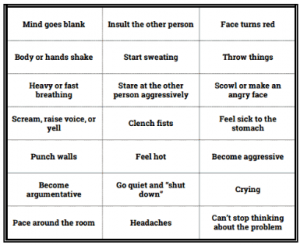What is anger ?:
The experience of anger differs from person to person.Variables like how often anger occurs, how intensely it is felt, and how long it lasts are different for each person. People also vary in how easily they get angry as well as how comfortable they are with feeling angry. Some people are always getting angry while others seldom feel angry.

Anger can be constructive or destructive. When well managed, anger or annoyance has very few detrimental health or interpersonal consequences. At its roots, anger is a signal to you that something in your environment isn’t right. It captures your attention and motivates you to take action to correct that wrong thing.
How you end up handling the anger signal has very important consequences for your overall health and welfare, however. When you express anger, your actions trigger others to become defensive and angry too. Blood pressures raises and stress hormones flow. Violence can ensue. You may develop a reputation as a dangerous ‘loose cannon’ whom no one wants to be around.
Out of control anger alienates friends, co-workers and family members. It also has a clear relationship with health problems and early mortality. Hostile, aggressive anger not only increases your risk for an early death, but also your risk for social isolation, which itself is a major risk factor for serious illness and death. These are but two of many reasons why learning to properly manage anger is a good idea.
2.Find out the reasons for your anger:

If you are getting angry at the same things everyday and too often .Make a list of the most likely things that make your blood boil.Sit down and make a list of the things that are most likely to infuriate you.This can help you avoid anger these situations when they arise again or, when that’s not possible, know what steps you should take to soothe your angry feelings.



















